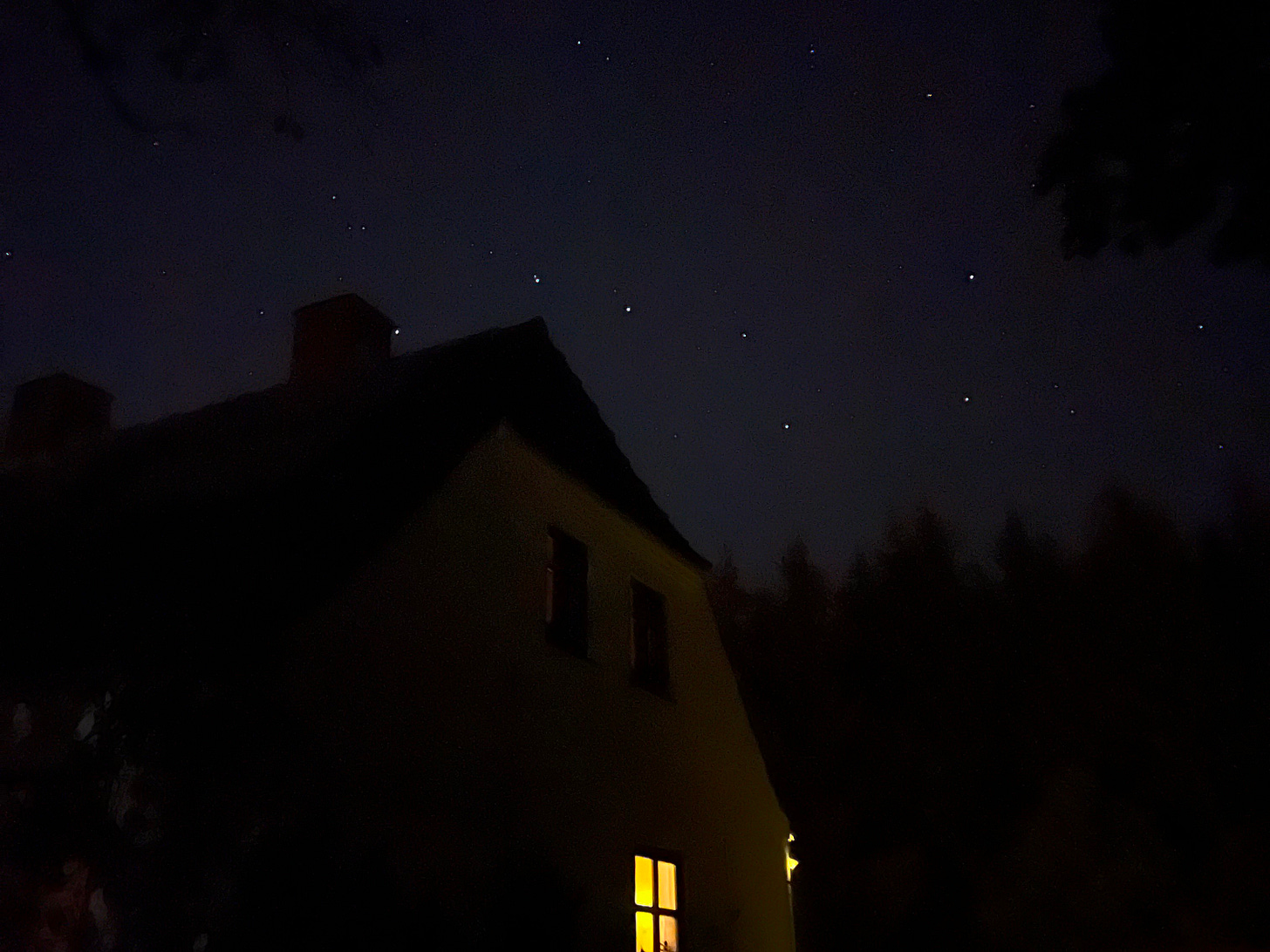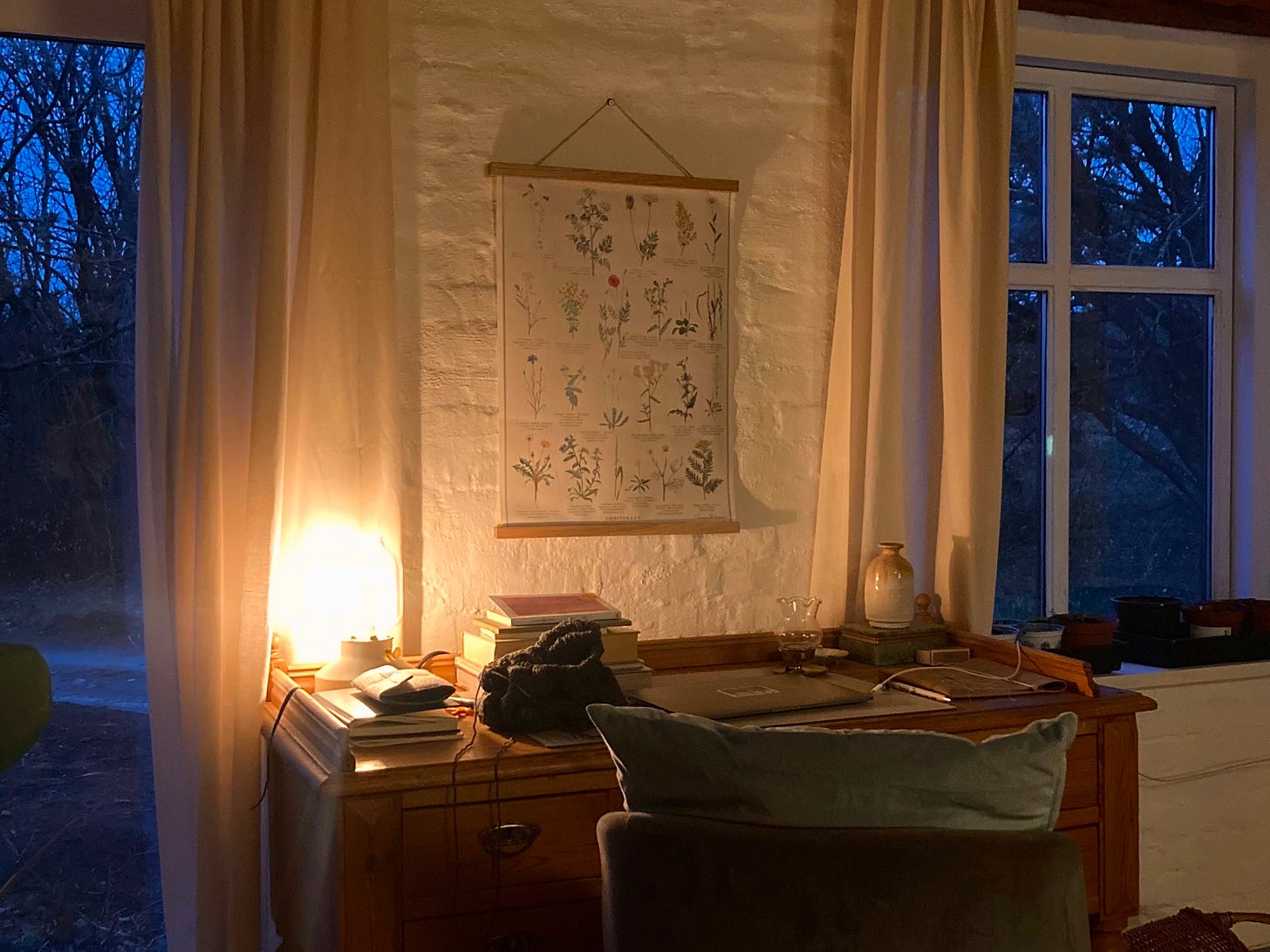The last day of October brought an autumn storm to our little Danish homestead. It took all the beautiful orange, brown and red leaves off the trees, and left us in with the bare and quiet that is the month of November.
The moon was completely dark and new when I rose in the middle of the stormy night with my child. She still wakes up some nights at two or three o’clock. She has done this since she was two months old, and nothing we have ever done has helped her awakening.
It was in that night, when I was looking at the clock, that I realized, a new time had begun. The clocks were turning back into winter time. A time of night, a time of darkness. As I looked at the clock ticking, it seemed somehow slower, as if the time was stretching out into the dark void of the night. At some point in that night I could swear the clock stopped ticking, and stood completely still.
Everything was quiet.
For me, November is a month where everything seems to stand still, bare and bleak. It is a time of quiet acceptance that no more work will be done, and a month of gratitude for what we managed to achieve in the previous season of light.
Just this autumn we wrote the year the house was built back onto the outer wall, like it would originally have been written. 1929. Now it shines light on the house from the small road that runs beside it.
With the writing on the wall it feels more and more like the house is slowly returning to its original form and its original purpose. Back into being a homestead, instead of another old, abandoned house, that someone would probably tear down a couple of years from now, if we had not come by.
It was one of these autumn days, when we were in the cottage garden, putting up a fence, that a car rolled by ever so slowly.
Two women sat inside, and the youngest woman who was driving the car, put it to a stop and rolled down the window.
“Good-day,” she said and smiled. “This used to be my grandmothers house. We heard from some of the your neighbors that you had been putting a lot of work into making it neat again, so we thought we would drive by.”
“Thank you so much for stopping by,” I said. “Where your grandmother called Astrid?”
“Yes, she were,” she said and gestured towards the older lady in the passenger seat. “And this is my mother. Astrid was her mother-in-law.”
I had heard about Astrid from some of the older neighbors, who always talked very fondly of the woman who lived here till her death. It was her late husband, who had originally built the house and farmed the land back in 1929, when he was just 25 years old.
Astrid and her husband had both lived here till their deaths. That’s when the previous owners to us had taken over the land and let it run wild.
But if you looked closely behind nettles and in the high grasses you could still find small findings from the homestead that used to be.
Just in the cottage garden, we found beautiful and old flower species would pop up from the ground, seemingly out of nowhere, and in the middle of the garden, an old crabapple tree stood shining with apples. The english term for crabapple falls short of the Danish: Paradisæble, directly translated to apple of paradise.
“It so funny,” the younger woman said. “The place is starting to look like it did back then. I remember we used to drink lemonade and eat cake here in the back garden, just by that tree,” she said and pointed to the apple tree.
We exchanged some formalities, and asked them to please return some time if they wanted to, as we would love to hear more and see some old pictures of the place, if they had any. They promised to be back, but so far, we haven’t seen them still.
When Herluf was done putting up the fence, the apples had started to fall from the tree. We let in our two ducks to the cottage garden, as they would eat any apples, keep down the grass and simultaneously fertilize it, so that we might have a bright green cottage garden for next season.
Herluf put up our newly acquired garden table and chairs under the apple tree, and we spend one bright and sunny afternoon out there, before the storms of late October set in.
Now, in the morning hours, when the dusk finally comes into the cottage garden, I see the bare apple tree, and the table decked with frost after another chilly night. The ducks are there no longer, but have been slaugthered just in time for winter.
Time stands still in those morning hours, when I have finally put my baby girl back to sleep, and I am sat by my desk, writing.
And even though the child soon wakes again, and another day properly begins, the twilight never seems to leave our little cottage garden. It lingers throughout the day, as I suspect it will from here on till spring.
Spring is when time will begin a new, with the first of the snowdrops flowers popping up from the ground. Till then, our work will be done, and time will be standing still.
Writing Prompt
What teachings has this years November for you?
Please share your insights in the comments, and let us connect with eachother in this rather bare and bleak time of the year ❤️
Read the next chapter of Our Homestead Journey:
Bracing Ourselves for Winter
Last winter was our first winter in our small, Danish homestead. It was also the coldest winter in 20 years with several days reaching temperatures of minus 10 degrees.







What a lovely story you share here about the beginnings of your home! I first read about it in the notes on your YouTube channel and I couldn't wait to come here to visit your blog. Thanks for sharing!
Dear Anne... November has brought dread. Specially in my sunny adopted country's corner in Florida. It's dark and bleak figuratively, emotionally, spiritually. I'm from Venezuela. And this election has brought back my PTSD. It took me awhile to call this country home. In spite of my many visits, studies and even a summer home. This is what I posted this week